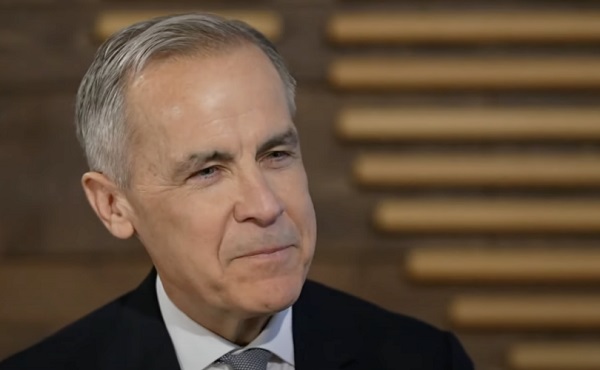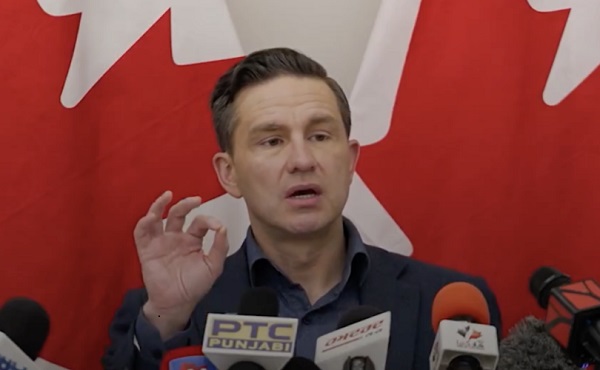National
Mark Carney admits he is an ‘elitist’ and ‘globalist’ but claims that is what Canada needs

From LifeSiteNews
In a recent interview, Liberal Party frontrunner Mark Carney admitted that ‘people will charge me with being elitist or a globalist,’ but that such qualities happen ‘to be exactly what we need.’
World Economic Forum-linked Liberal leadership candidate Mark Carney admitted that not only is he a “globalist” and an “elitist,” but that it is exactly those attributes which make him qualified to become prime minster.
In a February 15 interview on The Rest is Politics podcast with British journalist Alastair Campbell, who is also a former Labour Party strategist, Carney bragged that he knows “how the world works” and “how to get things done” for Canada, and that his being a globalist is what is needed for the country.
“I’m connected and I can deliver for the country,” he said. “People will charge me with being elitist or a globalist, to use that term, which is, well, that’s exactly, it happens to be exactly what we need.”
Carney was asked by Campbell, “When you’re sitting down with your key people, and you’re being absolutely honest with yourself and each other, what do you define as your core strength and your core weakness?”
“My weakness as a politician is I’ve not been a politician,” said Carney, who has never been elected to office but has served as a central banker in both Canada and England.
Carney, whose ties to globalist groups have had Conservative Party leader Pierre Poilievre call him the World Economic Forum’s “golden boy,” has a history of promoting anti-life and anti-family agendas, including abortion and LGBT-related efforts. He has also previously endorsed the carbon tax and even criticized Trudeau when the tax was exempted from home heating oil in an effort to reduce costs for some Canadians.
Just recently, Carney criticized U.S. President Donald Trump for targeting woke ideology, and has vowed to promote “inclusiveness” in Canada.
Carney also said last week that he is willing to use all government powers, including “emergency powers,” to enforce his energy plan if elected prime minister.
The Liberal Party of Canada will choose its next leader, who will automatically become prime minister, on March 9, after Prime Minister Justin Trudeau announced that he plans to step down as Liberal Party leader once a new leader has been chosen.
Carney is considered the Liberal Party’s top frontrunner.
2025 Federal Election
Next federal government should recognize Alberta’s important role in the federation

From the Fraser Institute
By Tegan Hill
With the tariff war continuing and the federal election underway, Canadians should understand what the last federal government seemingly did not—a strong Alberta makes for a stronger Canada.
And yet, current federal policies disproportionately and negatively impact the province. The list includes Bill C-69 (which imposes complex, uncertain and onerous review requirements on major energy projects), Bill C-48 (which bans large oil tankers off British Columbia’s northern coast and limits access to Asian markets), an arbitrary cap on oil and gas emissions, numerous other “net-zero” targets, and so on.
Meanwhile, Albertans contribute significantly more to federal revenues and national programs than they receive back in spending on transfers and programs including the Canada Pension Plan (CPP) because Alberta has relatively high rates of employment, higher average incomes and a younger population.
For instance, since 1976 Alberta’s employment rate (the number of employed people as a share of the population 15 years of age and over) has averaged 67.4 per cent compared to 59.7 per cent in the rest of Canada, and annual market income (including employment and investment income) has exceeded that in the other provinces by $10,918 (on average).
As a result, Alberta’s total net contribution to federal finances (total federal taxes and payments paid by Albertans minus federal money spent or transferred to Albertans) was $244.6 billion from 2007 to 2022—more than five times as much as the net contribution from British Columbians or Ontarians. That’s a massive outsized contribution given Alberta’s population, which is smaller than B.C. and much smaller than Ontario.
Albertans’ net contribution to the CPP is particularly significant. From 1981 to 2022, Alberta workers contributed 14.4 per cent (on average) of total CPP payments paid to retirees in Canada while retirees in the province received only 10.0 per cent of the payments. Albertans made a cumulative net contribution to the CPP (the difference between total CPP contributions made by Albertans and CPP benefits paid to retirees in Alberta) of $53.6 billion over the period—approximately six times greater than the net contribution of B.C., the only other net contributing province to the CPP. Indeed, only two of the nine provinces that participate in the CPP contribute more in payroll taxes to the program than their residents receive back in benefits.
So what would happen if Alberta withdrew from the CPP?
For starters, the basic CPP contribution rate of 9.9 per cent (typically deducted from our paycheques) for Canadians outside Alberta (excluding Quebec) would have to increase for the program to remain sustainable. For a new standalone plan in Alberta, the rate would likely be lower, with estimates ranging from 5.85 per cent to 8.2 per cent. In other words, based on these estimates, if Alberta withdrew from the CPP, Alberta workers could receive the same retirement benefits but at a lower cost (i.e. lower payroll tax) than other Canadians while the payroll tax would have to increase for the rest of the country while the benefits remained the same.
Finally, despite any claims to the contrary, according to Statistics Canada, Alberta’s demographic advantage, which fuels its outsized contribution to the CPP, will only widen in the years ahead. Alberta will likely maintain relatively high employment rates and continue to welcome workers from across Canada and around the world. And considering Alberta recorded the highest average inflation-adjusted economic growth in Canada since 1981, with Albertans’ inflation-adjusted market income exceeding the average of the other provinces every year since 1971, Albertans will likely continue to pay an outsized portion for the CPP. Of course, the idea for Alberta to withdraw from the CPP and create its own provincial plan isn’t new. In 2001, several notable public figures, including Stephen Harper, wrote the famous Alberta “firewall” letter suggesting the province should take control of its future after being marginalized by the federal government.
The next federal government—whoever that may be—should understand Alberta’s crucial role in the federation. For a stronger Canada, especially during uncertain times, Ottawa should support a strong Alberta including its energy industry.
2025 Federal Election
Donald Trump suggests Mark Carney will win Canadian election, touts ‘productive call’ with leader

From LifeSiteNews
‘It was an extremely productive call, we agree on many things, and will be meeting immediately after Canada’s upcoming Election,’ Trump wrote about Carney on Friday.
U.S. President Donald Trump says he had “an extremely productive call” with Prime Minister Mark Carney and implied that the World Economic Forum-linked politician will win Canada’s upcoming federal election.
“I just finished speaking with Prime Minister Mark Carney, of Canada,” Trump wrote on Truth Social Friday. “It was an extremely productive call, we agree on many things, and will be meeting immediately after Canada’s upcoming Election to work on elements of Politics, Business, and all other factors, that will end up being great for both the United States of America and Canada. Thank you for your attention to this matter!”
Reacting to the post, LifeSiteNews editor-in-chief John-Henry Westen wrote on X:

Trump’s comments come just weeks before Canadians head to the polls on April 28 for a federal election. Carney called the snap-election just nine days after taking over for Justin Trudeau as leader of the Liberal Party and prime minister.
Carney, an admitted “globalist” and “elitist,” formerly served as head of the Bank of Canada and Bank of England, and has extensive ties to globalist groups like the World Economic Forum and the United Nations.
Trump’s comments regarding Carney may prove significant as much of the debate in the mainstream media ahead of the election has been about how the prospective leaders will handle tariff threats and trade deals with America.
-

 Alberta2 days ago
Alberta2 days agoAlberta Institute urging Premier Smith to follow Saskatchewan and drop Industrial Carbon Tax
-

 Addictions1 day ago
Addictions1 day agoShould fentanyl dealers face manslaughter charges for fatal overdoses?
-

 2025 Federal Election2 days ago
2025 Federal Election2 days agoFool Me Once: The Cost of Carney–Trudeau Tax Games
-

 Alberta1 day ago
Alberta1 day agoAlbertans have contributed $53.6 billion to the retirement of Canadians in other provinces
-

 Also Interesting1 day ago
Also Interesting1 day agoThe bizarre story of Taro Tsujimoto
-

 2025 Federal Election1 day ago
2025 Federal Election1 day agoChinese Gangs Dominate Canada: Why Will Voters Give Liberals Another Term?
-

 Health16 hours ago
Health16 hours agoRFK Jr. Drops Stunning Vaccine Announcement
-

 Energy1 day ago
Energy1 day agoEnergy, climate, and economics — A smarter path for Canada





